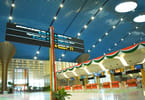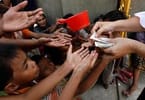گزريل هفتي، ملان، اٽلي, hosted one of the most theatrical fashion shows in years. The waist is small, and shoulders are big for next autumn, and that is just what we need. Last week, everything was glamorous, hotel rates were skyrocketing, and skinny models flocked the streets. While the most important buyers who deliver more than 30 percent of sales for Prada, Versace, Dolce Gabbana, and the like were visible, the Chinese buyers and designers went missing.
A day later after the alarming news on the coronavirus, Giorgio Armani held his fashion show on Sunday to an empty room, which was streamed around the globe.
Milan’s fashionable restaurants were booked months ahead of time. Now, Michelin Star chefs of Milan like Cracco and Berton said that business has dropped more than 80 percent within just a matter of days.
Only a week ago, Enit President Giorgio Palmucci said in an interview with Il Sole 24 Ore when questioned about coronavirus, “Don’t you run the risk of running into cancellations of bookings and arrivals?” To avoid this risk “it is crucial to send the message everywhere in the world that Italy is a safe country. On the other hand,” he said, “we are among the countries that have rightly taken more precautions than many others on the coronavirus.”
This has changed rapidly
Due to coronavirus, numbers of incoming tourism have plummeted, said Bernabe Bocca, President of the Italian Hotel Federation, in a press conference in Rome.
“We are very concerned. Until a few days ago, Italy was essentially unaffected by the epidemic.
“February and March are busy months – to the contrary to what you might think, we are not in the off-season: for some areas of the country, this is a period of intense activity. I am thinking, for example, of carnivals, white weeks, school trips, and important fairs. And we are talking of 14.5 million travelers generating 40 million overnights.” (For example, in Venice alone, 3 million visitors during the Carnevale period are received).
Bocca confirmed that many cancellations are coming in now, but whenever possible, hoteliers will try their best to find an agreement with their guests – for example offering a voucher for an alternative period, even if in legal terms the customer would not be entitled to it.
However, urgent action is needed to help businesses across the country before the long wave of cancellations turns into a tsunami, forcing many companies to reduce staff or even close their doors,” wrote ANSA.
Italy registered a 25% surge in coronavirus cases in 24 hours, and the infections remain centered on outbreaks in 2 northern regions – Lombardy and Veneto. But a few cases have turned up now in southern Italy, too.
Lombardy Governor Attilio Fontana put himself into self-isolation after a member of his team tested positive. On facebook he said he and the rest of his team had tested negative so far but would remain in quarantine for 14 days.
Italy’s Tourism Association Assoturismo said March accommodation bookings are down by at least €200m (£170m; $219m) because of the virus. Rome is seeing cancellations of 90% of bookings, 80% in Sicily. However, the figure only covers the value of cancelled trips and accommodations and does not include the lack of tourist spending and the hits being taken by tour guides, bus tours, and taxis, as well as bars, restaurants, and shopping throughout Italy.
What is the situation in Italy now?
Schools, universities, cinemas, and museums have been closed and public events cancelled. Milan’s Duomo has been closed since Monday and so is Milan’s famous opera house La Scala. Football matches are being played behind closed doors in stadiums.
Early Sunday morning the run into supermarkets started and left shelves empty. There is no chance to find any disinfectant, and people in Bologna were seen pushing out shopping carts full of bananas.
Milan is the powerhouse of Italy’s economy. But this Monday, Milan bankers were sent home with their computers to work from there.
Milan has a vibrant Chinatown of 30,000 inhabitants (while the Chinese population in Lombardy is around 80,000). Its “Highstreet” Via Sarpi is a place where Italians come for queuing at lunch for a take-away of the best the ravioli in town made by Chinese women who prepare them with each customer’s preferred filling. The area is considered to be safe and has small roads closed to traffic, which makes it also very attractive for Italian families to live there.
Picking up some stuff I had left with a Chinese tailor a few month ago but in a different part of Milan, I was surprised to not find the normal chaos of fabrics piling on the table and hundreds of bags to be picked up. This time it was different – tidy. Two men were sitting in front of an untouched sewing machine. “Where is your wife?” I asked. “In China. But she cannot come back; no flight and little hope it will be soon,” said the husband. “There is no business for us now and no clients. And that was before Milan went in tilt.”
In a television interview, Milan’s Mayor, Giuseppe Sala, last Thursday (Italy then had 19 cases of the virus reported) announced Milan’s most important International Furniture and Design Fair (April 21-26, 2020) will see a drop of 33,000 Chinese visitors to Milan which means a loss of 120 million euro. Meanwhile the International Furniture and Design Fair is now postponed to June 16-20, 2020.
On Friday morning, the numbers went up to 40 infections mainly near Lodi, 60 km south of Milan. By the evening, it became the epicenter in Italy for the coronavirus outbreak.
Eleven towns at the center of the outbreak – home to a total of 55,000 people – have been quarantined. There are fears that the outbreak may tip Italy into economic recession. The BBC’s Mark Lowen in Milan says fear is the reason for the city’s empty cafes and many hotel cancellations.
Italian Railways acted quickly as early as Sunday, February 23, when the FS (Ferrovia dello Stato) Group had announced that it had activated “special procedures to ensure the safety of passengers.” In addition, the company installed hand sanitizer dispensers on trains, distributed disposable masks and gloves to staff, increased on-board disinfectant cleaning, and provided leaflets of information from the Health Ministry.
Passengers can get travel refunds until March 1 which has been expanded now – for reimbursement of train tickets valid for FRECCE, Italo, Intercity, and regional trains in form of a bonus valid for one year. Refundable routes: all travel to and from the impacted areas of Northern Italy.
This past Wednesday, the World Health Organization (WHO) said that for the first time the virus was spreading faster outside China, where it originated. Globally, more than 80,000 people in about 40 countries have been infected with the new coronavirus, which emerged in December. The vast majority remains in China. This is followed by South Korea (3,300) and Italy (over 900). But most probably after one week of complete austerity and religious service, a part of the Duomo in Milan will be reopened again, and schools will reopen next Monday on March 2.
هن آرٽيڪل مان ڇا وٺو:
- A day later after the alarming news on the coronavirus, Giorgio Armani held his fashion show on Sunday to an empty room, which was streamed around the globe.
- plummeted, said Bernabe Bocca, President of the Italian Hotel Federation, in a press.
- he and the rest of his team had tested negative so far but would remain in.























